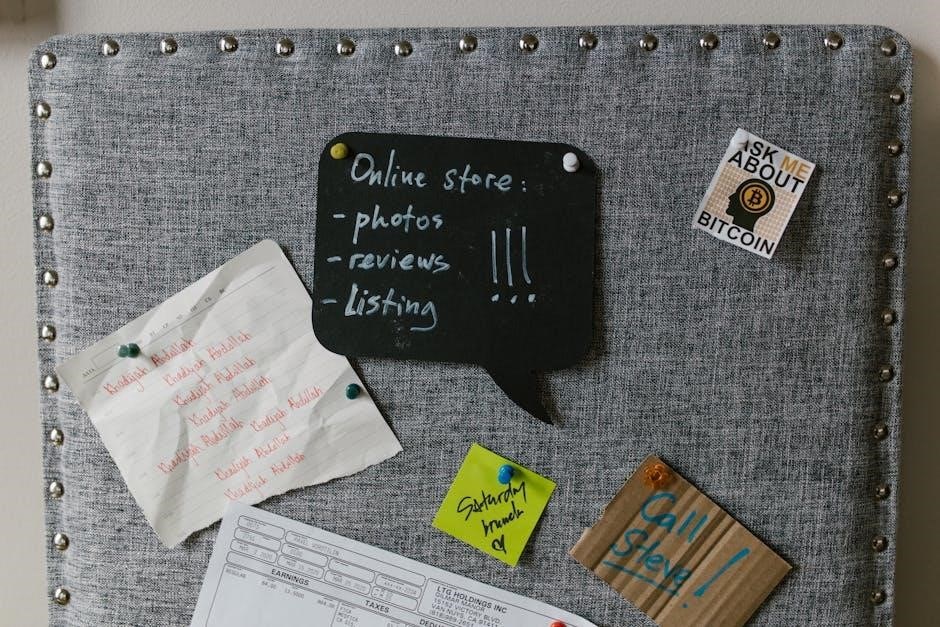
sel worksheets pdf
Social-Emotional Learning (SEL) worksheets are tools designed to help students develop emotional intelligence, social skills, and self-awareness․ Available as free PDFs, they support remote learning and include activities guiding reflection on emotions and interactions, fostering personal growth and positive relationships․ These resources are accessible through platforms like Teachers Pay Teachers and Mylemarks, offering a variety of exercises tailored for different age groups and learning needs․
What Are SEL Worksheets?
Social-Emotional Learning (SEL) worksheets are educational tools designed to help students develop essential life skills like emotional intelligence, empathy, and self-awareness․ These resources, often available as free PDFs, include activities and exercises that guide students in understanding and managing their emotions, improving social interactions, and building positive relationships․ SEL worksheets cover topics such as self-management, communication, and conflict resolution, making them adaptable for both classroom and remote learning environments․ They are widely accessible through platforms like Teachers Pay Teachers and Mylemarks, offering educators and parents structured ways to support students’ social-emotional growth․
Importance of Social-Emotional Learning
Social-Emotional Learning (SEL) is crucial for helping students develop emotional intelligence, self-awareness, and healthy relationships․ It equips them with skills to manage emotions, empathize with others, and navigate social challenges․ SEL fosters resilience, self-confidence, and collaboration, which are essential for personal and academic success․ By addressing real-world issues like stress and conflict, SEL worksheets provide structured activities that promote emotional growth․ These tools are vital for creating supportive learning environments, enabling students to thrive socially and emotionally, and preparing them for lifelong success in both personal and professional spheres․
How Worksheets Support SEL Development
Social-Emotional Learning (SEL) worksheets provide structured activities that guide students in developing essential life skills․ They offer prompts for reflection, helping students identify emotions, understand others’ perspectives, and develop positive relationships․ Worksheets also include exercises for managing stress, resolving conflicts, and building self-esteem․ By engaging with these tools, students can practice empathy, communication, and self-awareness in a safe and guided environment․ Worksheets are adaptable for remote learning and can be printed, making them versatile for various educational settings․ They empower students to apply SEL skills in real-world situations, fostering personal growth and emotional resilience․
Benefits of Using SEL Worksheets
Social-Emotional Learning worksheets enhance emotional intelligence, improve social interactions, and boost self-awareness․ They foster positive relationships, stress management, and conflict resolution skills, promoting overall student well-being and resilience․
Developing Emotional Intelligence

Social-Emotional Learning worksheets play a crucial role in fostering emotional intelligence by helping students recognize, understand, and manage their emotions․ These tools provide structured activities that guide learners in identifying their feelings, understanding triggers, and developing healthy coping strategies․ Worksheets often include exercises like emotion identification charts, scenario-based reflections, and empathy-building tasks․ By engaging with these resources, students gain the ability to navigate emotional challenges, develop self-awareness, and build resilience․ This foundation of emotional intelligence supports their personal growth and helps them interact more effectively with others in various social contexts․
Improving Social Skills
Social-Emotional Learning worksheets are effective tools for enhancing social skills, helping students navigate interactions with confidence and empathy․ These resources often include role-playing scenarios, group discussion prompts, and communication exercises that encourage collaboration and understanding․ Worksheets may focus on active listening, conflict resolution, and cooperation, providing students with practical ways to apply these skills in real-life situations․ By engaging with these activities, learners develop the ability to express themselves clearly, respect others’ perspectives, and build positive relationships․ Free PDFs offer accessible and engaging ways to support social skill development, both in the classroom and at home․
Enhancing Self-Awareness
Social-Emotional Learning worksheets play a crucial role in enhancing self-awareness by guiding students to recognize and understand their emotions, thoughts, and behaviors․ These resources often include prompts that encourage self-reflection, helping learners identify how their actions impact themselves and others․ Worksheets may feature exercises like emotion identification charts, personal goal-setting templates, and self-assessment checklists․ By engaging with these activities, students develop a deeper understanding of their strengths and areas for growth, fostering a positive self-image and emotional intelligence․ Free PDFs provide accessible tools for educators and parents to support this essential aspect of personal development in a structured and engaging way․
Building Positive Relationships
Social-Emotional Learning worksheets are instrumental in fostering positive relationships by teaching students essential skills like empathy, communication, and conflict resolution․ These resources often include activities that encourage collaboration, kindness, and respect among peers․ Worksheets may feature group exercises, role-playing scenarios, and reflection prompts to help students understand the impact of their actions on others․ By engaging with these tools, learners develop the ability to navigate social dynamics effectively, build trust, and maintain healthy interactions․ Free PDFs provide educators with accessible materials to promote teamwork, inclusivity, and mutual understanding, laying the foundation for strong, supportive relationships in and out of the classroom․
Key Skills Covered in SEL Worksheets
Social-Emotional Learning worksheets focus on developing self-management, empathy, and positive communication skills․ They also emphasize conflict resolution and understanding others’ perspectives, fostering emotional intelligence and social competence․
Self-Management Strategies
Social-Emotional Learning worksheets emphasize self-management strategies, helping students identify and regulate their emotions․ Activities guide learners in recognizing triggers, developing coping mechanisms, and setting personal goals․ These tools encourage reflection on behaviors and thoughts, fostering self-awareness and resilience․ By practicing mindfulness and self-control, students can better navigate challenges and make informed decisions․ Worksheets often include exercises for tracking emotions, creating calm-down plans, and setting achievable objectives․ These resources empower students to manage stress and develop healthy habits, laying the foundation for long-term emotional intelligence and personal growth․
Empathy and Understanding Others
Social-Emotional Learning worksheets focus on fostering empathy by helping students understand and connect with others’ feelings․ Activities include role-playing scenarios, perspective-taking exercises, and reflection prompts that encourage compassion․ These tools guide learners in identifying how their actions impact others, promoting kindness and cooperation․ Worksheets often feature stories or situations that require students to consider different viewpoints, fostering a deeper understanding of diverse emotions and experiences․ By practicing empathy, students develop stronger relationships and become more supportive members of their communities, enhancing their ability to navigate social interactions with sensitivity and care․
Positive Communication Skills
Social-Emotional Learning worksheets emphasize the development of positive communication skills, teaching students to express their thoughts and feelings clearly․ Activities include role-playing exercises, writing prompts, and group discussions that encourage active listening and respectful dialogue․ Worksheets often feature scenarios where students practice using “I” statements, resolving conflicts, and asking open-ended questions․ These tools help learners build confidence in sharing their ideas while fostering empathy and understanding in their interactions․ By mastering communication skills, students can navigate relationships more effectively and contribute to a supportive and inclusive environment, both in and out of the classroom․
Conflict Resolution Techniques
Social-Emotional Learning worksheets often include activities focused on conflict resolution, helping students develop strategies to manage disagreements constructively․ These exercises may involve role-playing scenarios, problem-solving prompts, and reflection questions that guide students in identifying peaceful solutions․ Worksheets encourage active listening, empathy, and respectful communication to de-escalate conflicts․ By practicing these techniques, students learn to approach challenges collaboratively, fostering positive relationships and a supportive classroom environment․ These tools empower learners to navigate real-world conflicts with confidence and understanding, promoting harmony in their interactions with peers and others․

Popular Topics in SEL Worksheets
SEL worksheets often focus on self-esteem, managing emotions, teamwork, and respect, providing activities that foster kindness, empathy, and positive relationships among students of all ages․
Self-Esteem and Confidence Building
SEL worksheets on self-esteem and confidence building help students recognize their strengths and develop a positive self-image․ Activities include identifying personal achievements, setting goals, and practicing affirmations․ These exercises encourage students to reflect on their values and abilities, fostering resilience and self-belief․ Worksheets often feature prompts that guide students in understanding their worth and overcoming self-doubt․ By focusing on individual growth, these tools empower students to build confidence and maintain a positive outlook on life, preparing them to navigate challenges with assurance and optimism․
Managing Emotions and Stress
SEL worksheets on managing emotions and stress provide students with tools to recognize, understand, and regulate their feelings․ Activities include identifying emotional triggers, practicing coping strategies, and learning relaxation techniques like deep breathing․ These exercises help students develop healthy ways to express and manage stress, fostering emotional well-being․ Worksheets often feature reflective prompts and scenarios to guide students in understanding their emotional responses and developing resilience․ By teaching stress management skills, these resources empower students to handle challenges effectively and maintain a balanced emotional state in various situations․

Teamwork and Collaboration
SEL worksheets on teamwork and collaboration focus on building skills for effective group interactions․ Activities include role-playing, problem-solving exercises, and reflection prompts to foster communication and mutual respect․ Students learn to value diverse perspectives, share ideas, and work collectively toward common goals․ Worksheets often feature scenarios that encourage active listening, conflict resolution, and trust-building․ These exercises help students develop a sense of responsibility within teams and understand the importance of cooperation․ By practicing collaboration, students build strong interpersonal skills and learn to contribute positively to group efforts, preparing them for real-world teamwork challenges․
Respect and Kindness in Interactions

SEL worksheets on respect and kindness focus on fostering positive interactions and empathy․ Activities include identifying kind actions, role-playing respectful conversations, and reflecting on the impact of words and behaviors․ Students learn to recognize and appreciate diversity, practice active listening, and develop inclusive attitudes․ Worksheets often feature scenarios that encourage students to think critically about how to treat others fairly and compassionately․ By engaging with these exercises, students build habits of kindness, respect, and empathy, creating a foundation for positive relationships and a supportive social environment․ These skills are essential for fostering a culture of understanding and inclusion․
How to Use SEL Worksheets Effectively
Integrate SEL worksheets into lesson plans, encouraging reflection and group discussions․ Provide feedback to guide students, fostering a supportive environment for social-emotional growth and skill development․
Integrating Worksheets into Lesson Plans
SEL worksheets can be seamlessly integrated into daily lesson plans by aligning them with curriculum goals․ Teachers can incorporate activities that focus on self-management, empathy, and positive relationships․ For example, worksheets on identifying emotions or resolving conflicts can follow a related lesson or story․ This approach ensures consistency and reinforces learning․ Additionally, worksheets can serve as homework or extensions for early finishers, providing opportunities for reflection and skill practice․ By embedding SEL into routine teaching, educators create a holistic learning environment that supports academic and emotional growth․ This integration fosters a culture of social-emotional development in the classroom․
Encouraging Student Reflection
SEL worksheets are powerful tools for fostering student reflection, helping learners explore their emotions, thoughts, and behaviors․ Many worksheets include prompts that guide students in identifying how their actions affect others and understanding their emotional responses․ Reflective activities, such as journaling or self-assessment checklists, encourage students to process their experiences and develop self-awareness․ By incorporating these exercises, educators help students connect their learning to real-world scenarios, fostering emotional intelligence and personal growth․ Reflection-based worksheets also provide insights into students’ progress, allowing teachers to offer targeted support and celebrate successes․
Facilitating Group Discussions
SEL worksheets provide structured prompts and activities that encourage meaningful group discussions, fostering empathy and collaboration․ These resources often include role-playing scenarios, open-ended questions, and problem-solving exercises that promote active listening and respectful communication․ By engaging in these activities, students learn to express their thoughts clearly and consider diverse perspectives․ Worksheets also offer opportunities for peer feedback and shared reflection, strengthening social bonds and emotional intelligence․ Many SEL PDFs are designed to adapt to remote learning, ensuring all students can participate and benefit from collaborative learning experiences․ This approach helps create a supportive environment for social-emotional growth․

Providing Feedback and Guidance
SEL worksheets offer opportunities for educators to provide constructive feedback, helping students reflect on their progress and growth․ These resources often include reflection prompts that guide students in identifying their strengths and areas for improvement․ Educators can use worksheets to offer individualized support, fostering a deeper understanding of social-emotional concepts․ By reviewing completed activities, teachers can provide meaningful insights, encouraging students to develop self-awareness and emotional intelligence․ This feedback loop strengthens the learning process, ensuring students feel supported as they navigate their social-emotional development․ Regular guidance helps students connect their learning to real-world scenarios, enhancing their ability to apply SEL skills effectively․
Free SEL Worksheets for Elementary School
Free SEL worksheets in PDF format are available for elementary students, covering topics like self-management, empathy, and positive relationships․ These resources are adaptable for remote learning or printing․
Worksheets for Self-Management
Self-management worksheets help students develop skills like self-control, goal-setting, and stress management․ These PDF resources guide students in identifying emotional triggers and creating strategies to stay focused․ Activities include reflection exercises, checklists, and planners to track progress․ Designed for elementary students, these worksheets are adaptable for remote learning or classroom use․ They encourage students to take ownership of their behaviors and emotions, fostering independence and resilience․ With interactive and engaging formats, these tools make learning self-management fun and effective, preparing students for real-world challenges․

Activities for Empathy Development
Empathy development activities in SEL worksheets help students understand and connect with others’ feelings․ These exercises include identifying emotions in scenarios, role-playing, and perspectives-taking tasks․ Worksheets guide students to reflect on how their actions impact others, fostering compassion․ Available as free PDFs, these resources are adaptable for remote or classroom use․ They encourage students to engage in meaningful discussions and build positive interactions․ By practicing empathy, students develop stronger relationships and a deeper understanding of diverse perspectives, creating a supportive and inclusive environment for everyone․
Exercises for Positive Relationships
Exercises for positive relationships in SEL worksheets focus on fostering healthy interactions and mutual respect․ Activities include identifying ways to show kindness, practicing active listening, and resolving conflicts peacefully․ Worksheets often feature scenarios where students can role-play or discuss appropriate responses․ These exercises help students build trust, communicate effectively, and value diversity․ Available as free PDFs, they are ideal for remote or classroom settings․ By engaging in these activities, students learn to collaborate, express appreciation, and maintain respectful boundaries, laying the foundation for strong, positive relationships throughout their lives․

SEL Worksheets for Remote Learning
Social-Emotional Learning worksheets are adapted for remote learning, offering accessible PDFs with activities that promote emotional intelligence and social skills․ These tools are designed to engage students virtually, fostering reflection and growth through interactive exercises tailored for online environments․
Adapting Worksheets for Online Use
SEL worksheets are easily adapted for online learning, with free PDFs available for remote use․ These resources, found on platforms like Teachers Pay Teachers, are designed to engage students virtually․ Interactive exercises and prompts guide reflection on emotions and interactions, fostering growth․ Worksheets are printable or viewable digitally, making them accessible for all learners․ They include activities that promote emotional intelligence, social skills, and self-awareness, helping students navigate personal and social challenges effectively․ This adaptability ensures continuous SEL development, even in remote environments․
Engaging Students in Virtual Activities
SEL worksheets are designed to engage students in virtual activities, fostering participation and interaction․ Free PDF resources, such as those from Teachers Pay Teachers, offer interactive prompts and exercises that encourage reflection and discussion․ These tools are ideal for remote learning, allowing students to explore emotions, empathy, and social skills through digital platforms․ Activities like identifying emotions, role-playing scenarios, and collaborative tasks promote engagement and connection․ By integrating these worksheets into virtual classrooms, educators can ensure students stay motivated and connected, supporting their social-emotional growth in online environments․
Ensuring Accessibility for All Learners
SEL worksheets are designed to be accessible for all learners, ensuring inclusivity and equity in social-emotional development․ Free PDF resources, such as those from Teachers Pay Teachers and Mylemarks, are easily downloadable and adaptable for diverse learning needs․ These worksheets often include clear instructions, visual aids, and flexible activities to accommodate different learning styles․ By providing materials in widely accessible formats, educators can ensure that every student, regardless of their abilities or learning environment, can benefit from SEL activities․ This inclusivity fosters a supportive learning environment for all students to thrive socially and emotionally․

Resources for SEL Worksheets
Discover a variety of SEL worksheet resources, including free PDFs from Teachers Pay Teachers, Mylemarks, and other trusted platforms․ These tools offer activities for self-esteem, empathy, and social skills, ensuring accessible learning for all students․
Teachers Pay Teachers Marketplace
Teachers Pay Teachers (TpT) is a trusted marketplace offering a wide range of SEL worksheet resources, including free and paid options․ Educators can find printable SEL worksheets PDFs designed for various grade levels, focusing on skills like self-awareness, empathy, and conflict resolution․ These resources are created by experienced teachers and align with curriculum goals, making them ideal for classroom or remote learning․ TpT provides a convenient platform for educators to discover and download activities that promote social-emotional growth, ensuring students develop essential life skills in an engaging and structured manner․
Mylemarks SEL Resources
Mylemarks is a premier destination for social-emotional learning resources, offering a variety of free SEL worksheets PDFs tailored for children and teenagers․ These resources address challenges like anger, anxiety, and low self-esteem, while fostering social skills and emotional intelligence․ Mylemarks provides activities designed to help students navigate real-world issues, making it easier for educators and parents to support their development․ With a focus on practical and engaging exercises, Mylemarks ensures that SEL skills are taught in a relatable and effective manner, promoting positive growth and resilience in young learners․
Free Printables for Social-Emotional Learning
Free SEL printables are invaluable tools for teaching students to communicate effectively, express emotions, and maintain healthy relationships․ These resources, available as downloadable PDFs, are designed to be engaging and easy to use, making them perfect for classroom or home learning․ Many printables focus on specific skills like self-awareness, empathy, and problem-solving, while others offer fun, interactive activities to make learning enjoyable․ Websites like Teachers Pay Teachers and Mylemarks provide a wide range of free printables, ensuring educators and parents have access to high-quality materials to support social-emotional development in children․
Creating Your Own SEL Worksheets
Designing custom SEL worksheets allows educators to tailor activities to specific needs, incorporating real-world scenarios and aligning with curriculum goals for effective social-emotional development․
Designing Effective SEL Activities
Creating impactful SEL activities involves clear objectives, age-appropriate content, and interactive elements․ Incorporate real-world scenarios to help students connect skills to daily life․ Focus on developing emotional intelligence, empathy, and self-management through guided reflections and group discussions․ Ensure activities are adaptable for remote learning and include visual aids for engagement․ Align exercises with curriculum goals to reinforce learning; Provide opportunities for feedback and self-assessment to foster growth․ Use relatable topics like teamwork, kindness, and stress management to make activities meaningful․ This approach ensures worksheets are both educational and enjoyable, promoting lasting social-emotional development․
Incorporating Real-World Scenarios
SEL worksheets often include real-world scenarios to help students apply skills like empathy, self-management, and conflict resolution․ These scenarios, such as resolving peer conflicts or managing stress, make learning relatable․ By connecting abstract concepts to everyday challenges, worksheets enable students to practice problem-solving and decision-making․ Interactive exercises encourage reflection on how actions impact others, fostering emotional intelligence․ Real-world examples also help students develop practical strategies for navigating social situations, making SEL more engaging and relevant․ This approach ensures students are prepared to handle real-life challenges with confidence and resilience, bridging the gap between classroom learning and real-world application․
Aligning Worksheets with Curriculum Goals
SEL worksheets can be tailored to align with specific curriculum goals, ensuring they complement existing lesson plans․ Educators can adapt worksheets to focus on particular skills, such as self-awareness or empathy, while integrating them seamlessly into academic objectives․ Many resources, like those from Teachers Pay Teachers, offer customizable templates that cater to diverse learning needs․ By aligning SEL activities with curriculum goals, teachers can create a cohesive learning experience that supports both academic and social-emotional development․ This approach ensures that worksheets are purposeful and contribute to students’ overall growth, making them a valuable tool for educators seeking to foster well-rounded learners․

Assessing Student Progress with Worksheets
SEL worksheets help track students’ growth by monitoring skill development and identifying areas needing support․ They provide insights into emotional intelligence and social skills, guiding tailored instruction․
Monitoring Skill Development
Social-Emotional Learning (SEL) worksheets are valuable tools for monitoring students’ progress in developing essential life skills․ By completing activities focused on self-awareness, empathy, and self-management, students demonstrate their understanding and growth․ Teachers can use these worksheets to assess improvements in emotional intelligence, social interactions, and problem-solving abilities․ Regular use of SEL worksheets provides insights into areas where students may need additional support, allowing for tailored interventions․ Over time, these assessments help track developmental milestones, ensuring students build a strong foundation for lifelong social-emotional growth and well-being․
Using Worksheets for Formative Assessment
Social-Emotional Learning (SEL) worksheets are effective tools for formative assessment, allowing teachers to gauge students’ progress in real-time․ These resources provide insights into students’ emotional intelligence, social skills, and self-awareness․ By analyzing completed worksheets, educators can identify strengths and areas needing support․ Worksheets often include prompts that encourage reflection, enabling teachers to assess how well students understand and apply SEL concepts․ This informal assessment method helps tailor instruction, ensuring students receive targeted guidance․ Regular use of SEL worksheets fosters a growth-oriented environment, making formative assessment both practical and impactful for student development․
Identifying Areas for Further Support
Social-Emotional Learning (SEL) worksheets are invaluable for identifying areas where students may need additional support․ By analyzing completed worksheets, educators can pinpoint challenges in skills like self-management, empathy, or communication․ These tools often include reflection prompts, allowing teachers to assess students’ understanding of their emotions and interactions․ Patterns in responses can reveal specific difficulties, enabling targeted interventions․ Worksheets also provide concrete examples of student thinking, making it easier to address gaps in emotional intelligence or social skills․ This process ensures personalized support, fostering growth and helping students overcome specific challenges effectively․ Regular use of SEL worksheets enhances the ability to identify and address these needs promptly․
Social-Emotional Learning worksheets are powerful tools for fostering emotional intelligence, social skills, and self-awareness․ Their adaptability for remote learning and availability as free PDFs make them invaluable for educators and students alike․
The Impact of SEL Worksheets on Student Growth
Social-Emotional Learning worksheets significantly enhance students’ emotional intelligence, social skills, and self-awareness․ By addressing topics like self-esteem and empathy, these tools empower students to navigate personal and social challenges effectively․ Available as free PDFs, they provide accessible resources for remote learning, ensuring consistent skill development․ Interactive activities encourage reflection, fostering a deeper understanding of emotions and relationships․
These worksheets prepare students for lifelong social-emotional growth, equipping them with essential life skills․ Their adaptability and accessibility make them a valuable resource for educators and parents, promoting positive development in all learners․
Encouraging Lifelong Social-Emotional Development
Social-Emotional Learning worksheets play a crucial role in fostering emotional intelligence, social skills, and self-awareness, laying the foundation for lifelong personal and relational growth․ By addressing topics like self-esteem and empathy, these tools empower students to navigate challenges and build positive relationships․ Available as free PDFs, they offer accessible resources for remote learning, ensuring consistent skill development․ Interactive activities encourage reflection, fostering a deeper understanding of emotions and interactions․ These worksheets prepare students for future challenges, equipping them with essential life skills that promote resilience, kindness, and effective communication, ultimately supporting their journey toward becoming compassionate and confident individuals․